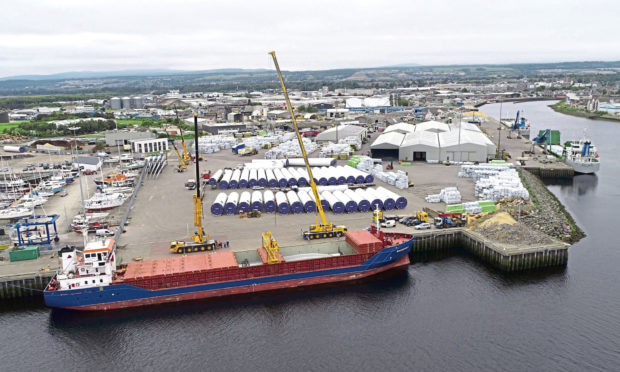The Port of Inverness is “as prepared as it can be” to cope with any impacts of the UK’s departure from the EU at the end of the month, according to its chief executive.
Sinclair Browne predicted there would be no significant post-Brexit delays to operations at the harbour, where supplies of fuel and winter road salt for the north are among the vital cargoes that regularly arrive.
Mr Browne said that while there was “still no real certainty” on what would happen from January 1, he was confident preparations made by the trust port over the past two years would prove effective.
And he added the Highland capital’s harbour had enjoyed a benefit from the Brexit process, with a wind farm developer deciding to deliver components there early, before the end of the transition period, in advance of work starting on the project in the spring.
Mr Browne said: “Things are constantly changing and there is still no real certainty on what happens, albeit we know that after December 31 we will be leaving the EU with or without a trade deal. We have put measures in place over the last 24 months in readiness for this date.
“We have received from HMRC (HM Revenue and Customs) approved economic operator status, which allows us to process and trade with non-EU countries and, as of January 1, all EU countries will be viewed as non-EU countries.
“We have also engaged with Border Force and are a recognised border control post… which will allow the free flow of goods into and through Inverness.
“We’ve engaged actively with all port users to ensure they are ready for Brexit, and from these discussions it would appear they are indeed ready and have been taking a very positive and proactive approach to being prepared.
“We’ve got protocols in place for when cruise ships re-appear and passenger arrivals, and how we deal with that.”
He added: “Across the board, and this goes for port users, Border Force and all the people we’ve been dealing with, there has been a very positive collaborative approach to dealing with the issues arising out of Brexit.
“I don’t say we’ve got everything right, but I am confident we are as prepared as we can be to deal with what happens on January 1.”
The chief executive’s comments came in an address to the annual meeting of the trust port, which was held online.
The organisation’s annual report and results for the year to the end of March were published following the event.
The accounts showed that, with no wind farm cargoes arriving, turnover dipped to £1.47m in the year to March 31 2020 from £1.83m in 2018-19, and the port’s operating surplus also fell, to £244,317 from £389,213 over the period.
During its 2019-20 financial year, the total tonnage through the harbour was 649,187 tonnes.
Of that, imports accounted for 489,266t, with fuel for civilian and military use, road salt and birch logs the main cargoes. Exports, mainly of wood products and pellets, totalled 160,750t.
The port has remained open throughout the Covid-19 crisis, with strict protocols in place for safe working practices.
Mr Browne highlighted its role in handling materials for the Norbord factory, near Inverness, which supplied sterling board for the construction of Nightingale hospitals.
